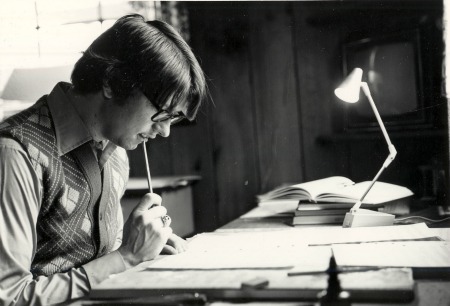Page 246 • (2,597 results in 0.069 seconds)
-
conditions of a novel organic pseudo-condensation synthesis by varying the temperature, metal stabilizing group and solvent used. In doing so, yields of above 80% were realized. Further, substrate scope analysis was performed and potential enzymatic inhibition was investigated via computer modeling. 1:40 pm - Effect of Dithiocarbamate Ligands on Cadmium Selenide Nanospheres and Nanobelts Jenny Stein, Senior Capstone Seminar We study how ligands bind to different shapes of cadmium selenide nanocrystals
-
recipient of the Lemelson-MIT student prize for invention. He holds an S.B. in Electrical Engineering with a Minor in Mechanical Engineering from MIT, an M.S. in Electrical Engineering from University of California, Berkeley, and an S.M. and Ph.D. in Computer Science from MIT. Dr. McLurkin presented his talk: “The Future of Robotics is Swarms: Why a Thousand Robots are Better than One” on March 5, 2019. Multi-robot systems are the future of a futuristic field. Large populations of robots can solve many
-
students will present their capstone projects, and a poster session will highlight the work of our BSN and MSN graduates. Many of you are aware that Ramstad Hall is scheduled to undergo some remodeling/renovations this summer and next. This summer the construction work will focus on 2nd floor, providing a new larger classroom and an expanded and upgraded Health Assessment Lab. Next summer the renovations will focus on our 3rd floor Skills Lab, expanding into the area now occupied by the computer and
-
Friend for 60 Years Call her sharp. Call her entertaining. Call her witty. Call her irrepressible. But whatever you do, hang on. It’s a wild ride in the world of Volly Grande ’36 ’65.A Policy of Giving Back to PLUScott and Sherith Squires’ story started at—and just keeps coming back to—Pacific Lutheran University. They met at PLU and graduated in 1988. He was a Communication major and a football player; she was a Psychology major and a cheerleader.Even After Graduation, a Way to Stay Involved—65
-
the student’s performance in these areas: 1. Course work: The grade point average in chemistry courses up to the semester prior to graduation must be at least 3.50. 2. Written work: From the time a student declares a major in chemistry, the student should keep copies of selected outstanding work (e.g., laboratory, seminar, and research reports) for later summary evaluation. 3. Oral communication: Students must evidence ability to communicate effectively as indicated by the sum of their
-
included the story of the Brill family, survivors of Exodus 1947; Renee Firestone, Auschwitz survivor; and Pierre Sauvage.Learn more about the Survivors and Rescuers conference 2013 Powell-Heller Conference for Holocaust EducationSixth Annual Powell-Heller Conference for Holocaust Education: Scholar Deborah Lipstadt; Author Cara De Silva; PLU Dean of the School of Arts and Communication and pianist Dr. Cameron Bennett; PLU professor and art historian Heather Mathews and others join to present
-

Russell gave the first naming gift to launch the new Music facility, which would be named the Mary Baker Russell Music Center. Mary Baker Russell listens to Dave Robbins Even in the early seventies, the department had clearly outgrown the small space they shared with theatre and communication in Eastvold. Youtz remembers buckets catching drips of rainwater while he lectured. Robbins wrote the very first report justifying a new fine arts music building, which was approved by the regents in 1978. “The
-
health issues including stress, anxiety and depression.A community that cares When the pandemic hit, the university pivoted quickly to ensure students’ needs were being met, and communication about these services and opportunities became vital for the well-being of the PLU community. “When (PLU) sends out resources via email, I think it’s really important and it’s reaching certain people, but we feel it may not be reaching everyone,” said Ricky Haneda ’22, a psychology major and Psychology Honors
-
October 22, 2010 http://www.youtube.com/watch?v=jmbzzLNVje0 Three PLU MediaLab students went from Canada to the Gulf to explore the issue of oil for their documentary “Oil Literacy.” Understanding oil By Chris Albert This past summer, students from PLU’s MediaLab embarked on a journey to learn, ask and explore oil and energy consumption in the United States. “It’s not about the either or debate,” said Lorna Rodriguez, a senior communication major who worked on the film, along with Kari Plog and
-

want to make sure that I’m representing all Tacomans, so I want to make sure I’m still taking time to listen during the policy making like I was on the campaign trail. (Those key goals include improving walkability in neighborhoods, and building a connected network of multimodal trails; expanding opportunities for kids and opening up communication channels with them; and making it easier for people to get involved in local government so they have representation and voice.) What advice do you have
Do you have any feedback for us? If so, feel free to use our Feedback Form.


